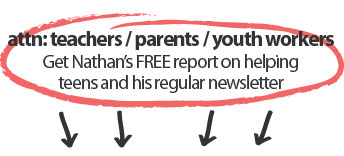The 3 Most Important Elements of the Student Career Blueprint
When I was at school the full extent of my career counselling experience was:
Teacher:
“Here’s a careers guide, have a look and see if there are any jobs you think might interest you.”
Me:
“Thanks!”
(Goes and finds the career which earns the most money).
These days we understand a whole lot more about working with young people to help them identify appropriate career pathways AND help them to personally develop a strong foundation to help them survive the journey.
According to the Australian Blueprint for Career Development there are 11 key competencies for promoting intentional career development, lifelong learning and life/work balance. These eleven competencies span three primary learning areas.
These 3 learning areas are:
- Personal Management;
- Learning and Work Exploration; AND
- Career Building
The Blueprint identifies the skills, attitudes and knowledge that individuals need to effectively manage their life, learning and work roles in the 21st century.
People develop these career management skills in a variety of settings: at home, in classrooms, in the playground, in the workplace and on the sporting field. However, career development programs make the development of these competencies more intentional for more people.
Given that students spend a large percentage of their time at school, and they are in the phase of their life where they are developing the skills, attitudes and knowledge which will serve them later on in their careers journey, we must do all that we can to support them in that journey.
As someone who is passionate about Personal Development, working with young people every day in developing resilience, aspiration and everyday life skills I believe the 3 MOST IMPORTANT elements of the Australian Careers Blueprint are found in the Personal Management learning area:
- Build and maintain a positive self concept
- Interact positively and effectively with others
- Change and grow throughout life
These 3 competencies are foundational to a young person developing a successful career path as well as success in every area of life.
In my keynote presentation ‘Decide Your Own Destiny’ which I present in schools all over Australia, I define ‘Real Success’ this way:
- Knowing who you are;
- Work every day to be the BEST YOU that you can be;
- Living your life to make the world a better place
Through my own personal journey I have discovered that we can be distracted by an unrealistic picture of what success really is. Media and advertising bombards our minds with images of beauty, fashion, excessive wealth, setting ideals which are unrealistic and unachievable.
I share my own story of facing a family crisis where my mum, one of my best friends (yep I was a mummy’s boy) suffered two severe strokes over 2 years, leaving her paralysed fully, and incapacitated. After the 2nd stroke she was admitted to a nursing home for 24/7 care. She wasn’t able to do or say anything, and according to the media’s portrayal of success, she was a failure.
But she was still the same person, on the inside, she was just trapped in a body which wouldn’t work AND she impacted the lives of people around her, even when she couldn’t do or say anything! (and her legacy still lives on to this day – after she passed away at just 51 years of age).
So let’s have a bit of a deeper look at the 3 most important elements of the Australian Careers Blueprint.
1. Build and maintain a positive self concept
Self concept is who we think we are, the picture we have of ourselves, plus the picture we think others have of us. Self concept plays an important part in our overall wellness. It affects the ways we look at our body, how we express ourselves and interact with our friends, and it even influences how we make decisions. The potential for a positive self concept lies within each of us. Self concepts can be changed. They are not carved in stone.
A person with a positive self concept does not necessarily have more skills than a person with a poor self concept. But having a positive self concept helps when young people are faced with today’s critical issues. Therefore, one of the most important things you can do as you work with young people is help them develop a positive self concept.
One very important element of developing a positive self concept is self awareness. When young people understand themselves better (ie personality type, learning style, passions, interests etc) and know that different isn’t bad, it’s just different, they can be empowered to be the best they can be, and find a career path which suits them.
Here are a few tips to help in your work with students and young people to build and maintain a positive self concept:
- – Focus on the individual
- – Develop positive self talk in your young people
- – Promote individual responsibility for choices
- – Help the young person set realistic goals
- – Emphasise the positive and be generous with praise
- – Establish a safe environment for self discovery
- – Be a good listener
- – Focus on strengths
- – Provide opportunities for success / small wins
2. Interact positively and effectively with others
The world we live in is a product of the attitudes and actions of people towards each other.
Our attitude towards the people we engage and interact with in everyday situations will ultimately dictate the way we treat them.
When I was young I was raised with a foundational attitude towards the way I treated others known as the ‘Golden Rule’:
“Do unto others as you would have them do unto you.”
OR
“Treat others how you would like to be treated.”
The Golden Rule also known as the ethic of reciprocity describes the two way relationship between one’s self and one’s actions and its impact on others, that involves both parties equally and in a mutual fashion.
In “Decide Your Own Destiny” I share the story of growing up with a disability (Radio Ulna Synotosis) to bring out the idea that “Stuff Happens”. We live in a world which is less than perfect, and despite the fact that the media might present us with a picture of the ‘potential perfect world’ we need to understand that ‘stuff happens’ to all of us. Stuff which is less than ideal, stuff which we don’t want to happen, and is out of our control. But despite the stuff that happens to us we can live our lives in a way which makes a positive impact on the people and the world around us.
I use this story to help young people understand that no one’s life is perfect, its ridiculous for anyone to look at anybodies else’s life and think ‘I wish I had their life’ or ‘I wish I was like them’. We all have different stuff that we have to overcome and every bodies stuff is different. When we realise that nobodies life is perfect, we can then approach our interactions with other people with a little more compassion to understand that we really dont know what they might be going through.
There’s a song by Joe South called ‘Walk A Mile In My Shoes’ and some of the lyrics go like this:
“Walk a mile in my shoes, walk a mile in my shoes
Hey, before you abuse, criticize and accuse
Walk a mile in my shoes.”
Part of our responsibility as trusted adults working with young people is to help them develop the skills to interact positively and effectively with others, and a huge part of this is helping them develop perspective.
Here are a few tips to help you develop the skills in your young people to interact positively and effectively with others:
- – Have young people identify acceptable behaviours and values
- – Role model
- – Recognise and reward positive behaviors
- – Talk about ways to create a positive team environment
- – Use team building activities encourage and develop positive interactions
- – Have your students research the issues people face in 3rd world countries
3. Change and grow throughout life
Part 2 of my definition of ‘Real Success’ challenges young people to:
‘Work every day to be the BEST YOU that you can’
Anthony J. D’Angelo said:
“Develop a passion for learning.
If you do, you will never cease to grow.”
In my view, passion for learning and growth comes when the learning is aligned with a person’s interests and their styles (learning style, communication style and personality).
When we have a good understanding of ourselves, our passions, our interests and our styles it’s much easier to find career pathways and learning pathways which suit us. When we’re ‘in our groove’ learning comes more naturally and is less of a strain.
An Arabic proverb says:
“He that knows not, and knows not that he knows not is a fool.
Shun him
He that knows not,and knows that he knows not is a pupil.
Teach him.
He that knows,and knows not that he knows is asleep
Wake him.
He that knows, and knows that he knows is a teacher.
Follow him.”
The picture this proverbs paints so well is the idea of conscious competence and unconscious competence. As teachers and trusted adults it is our role to help shift the attitudes of the young people we work with from the idea that if they ‘dont know’ something they are dumb, to the challenge to find out what they ‘dont know’ and find out how to ‘know’ what they ‘dont know.’ (I dont recommend ‘Shunning people.’)
Life is a journey of self discovery. As a trained Strong Interest Inventory Assessment practitioner I help students identify potential career pathways based on their interests, work styles and learning styles, I get great satisfaction helping young people discover what they ‘dont know’ about themselves.
Here are a few tips to help you develop the skills in your young people to change and grow throughout life:
- – Help students focus on what they can learn from challenges and difficulties
- – Help develop research and study skills
- – Identify passions and interests and match them with learning opportunities
- – Identify learning and communication styles
- – Show students the benefits of being a self learner
So without writing a full thesis I believe these 3 competencies are the 3 most important and foundational elements for any student to develop intentional career development, lifelong learning and life/work balance.
These 3 are crucial for developing resilience and a solid foundation for young people to get a positive start on their career journey and life.
These principles have shaped my own life for the better, and, as a firm believer in the power of positive influence, I believe that you have the ability to help shape the lives of young people around you for the better.
I’ve made it my own personal mission to Engage, Inspire and Empower Young People to Positive Transformation. A huge element of this is helping young people develop the skills and tools to know themselves and identify the most suitable career pathway.
I cant do it on my own, we all have a part to play, so get cracking, sow some seeds of hope today!

